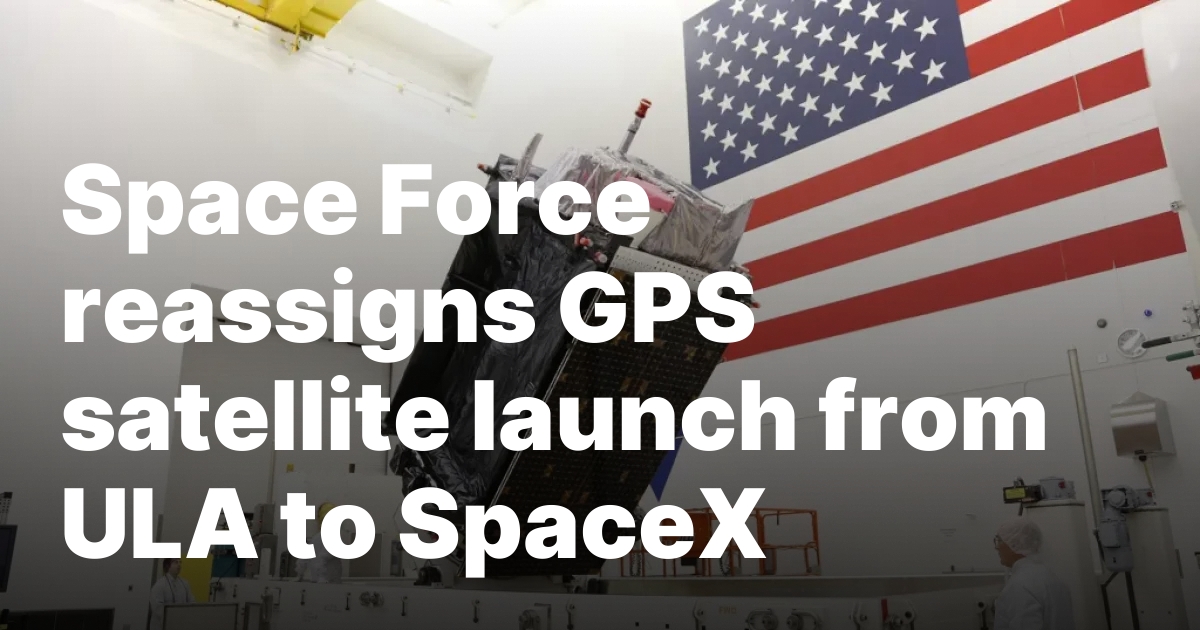

The Space Force has made a significant decision to reassign a GPS satellite launch from United Launch Alliance (ULA) to SpaceX, marking a notable shift in the space industry. This move comes as a surprise to many, as ULA has long been a trusted partner for national security space missions. This reassignment underscores the competitive nature of the space launch market and highlights SpaceX's growing influence in the sector. The decision follows a similar move in recent months, indicating a potential trend in the Space Force's launch provider selection process.
SpaceX's Competitive AdvantageSpaceX's successful bid for the GPS satellite launch comes as no surprise to industry experts. The company's proven track record of cost-effective and reliable launches has solidified its position as a top competitor in the space industry. With a string of successful missions under its belt, SpaceX has gained the trust of government agencies like the Space Force.
One key factor in SpaceX's favor is its reusable rocket technology. By landing and refurbishing rockets, SpaceX is able to significantly reduce launch costs compared to traditional methods. This cost-saving measure has made SpaceX an attractive option for government contracts, especially as agencies like the Space Force seek to maximize their budgets.
Additionally, SpaceX's rapid launch cadence has set it apart from competitors like ULA. The ability to quickly and efficiently launch satellites into orbit is a valuable asset for customers like the Space Force, who rely on timely access to space for national security purposes.
SpaceX's track record and future implicationsSpaceX has a proven track record of successful launches, including multiple GPS satellite launches for the Space Force. The company's reusable Falcon 9 rockets have significantly reduced the cost of access to space, making them an attractive option for government contracts.
By reassigning the GPS satellite launch from ULA to SpaceX, the Space Force may be signaling a shift towards prioritizing cost-efficiency and innovation in its launch providers. This decision could have broader implications for the future of the space industry, as SpaceX continues to disrupt traditional aerospace norms.
As SpaceX continues to demonstrate its reliability and cost-effectiveness, it is likely to secure more government contracts in the future. This could further solidify the company's position as a leading player in the space launch market, potentially challenging the dominance of legacy aerospace companies like ULA.
SpaceX's track record with GPS satellite launches
According to Dr. Smith, an aerospace analyst at SpaceTech Research, SpaceX has demonstrated a strong track record in successfully launching GPS satellites in recent years. The company's proven capabilities and reliability in delivering payloads to orbit may have been key factors in the Space Force's decision to reassign the GPS satellite launch from ULA to SpaceX.
Final ThoughtsIn conclusion, the recent reassignment of a GPS satellite launch from ULA to SpaceX by the Space Force highlights the competitive nature of the space industry and the evolving landscape of space exploration. This decision reflects the Space Force's strategic priorities and the capabilities of both companies in meeting the demands of national security. As SpaceX continues to expand its presence in the space sector, it will be interesting to see how this shift impacts future collaborations and launches within the industry.
Overall, the reassignment underscores the dynamic nature of space missions and the importance of adaptability in the ever-changing environment of space technology. With both ULA and SpaceX playing crucial roles in advancing space exploration, the collaboration between government agencies and private companies will continue to shape the future of space travel and satellite deployment.
As we look ahead to future missions and partnerships in space, it is clear that the Space Force's decision to reassign the GPS satellite launch holds broader implications for the industry as a whole, signaling a new era of competition and cooperation in the final frontier.
Source: http://spacenews.com/space-force-reassigns-gps-satellite-launch-from-ula-to-spacex/
Technology & Innovation
Nick is at the forefront of AI, cybersecurity, and emerging tech trends. With a keen understanding of how technology is reshaping industries, governments, and society, Nick breaks down complex tech topics into insightful, easy-to-understand reports.